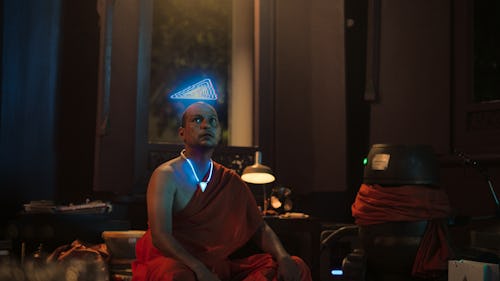
When Black Mirror first premiered in 2011, Netflix didn’t even exist in the U.K. The series aired on British TV channel, Channel 4, where stories of the dangers of social capital and tabloids enraptured audiences. It’s been over a decade now, and Black Mirror is now completely biting the hand that feeds it, actively mocking Netflix while streaming on the platform for viewers all over the world.
But if you are a little tired of Black Mirror’s dry British humor and “what if phones but too much” messages, Netflix also has the perfect antidote: an ambitious, cutting-edge anthology series that blends Black Mirror’s sci-fi perspective with an entirely new culture, resulting in a series that’s surprising shocking — and always a delight to watch.
Tomorrow and I is the heir apparent to Black Mirror. The Thai series, consisting of four 70-ish minute episodes so far, is also an anthology of sci-fi stories inspired by our reliance on technology. But where it differs is the culture: as denoted in the theme song, combining traditional Thai music with electronica, these stories are all told with Thailand’s unique culture and issues at its core.
For example, the first episode, “Black Sheep,” deals with space travel and cloning technology, but in its last act it takes a sharp turn into an exploration of trans identity and what we’ll do to change — and change for — the people we love, a fitting choice for a country among the most popular places for gender confirmation surgery. It’s an immensely touchy subject, but the episode handles it with such care that even cloning technology and moon bases feel like just a natural part of the world.
But that doesn’t mean that this show is afraid to get weird and goofy if the story calls for it. Episode 2, “Paradistopia,” turns the ever-popular concept of sex worker robots and turns it into a ‘60s- and ‘80s-fueled girl-boss journey, full of raunchy sex scenes and in-world commercials that feel like something out of a sci-fi softcore. Episode 4, “Octupus Girl,” is goofy in another way entirely, showing how one girl living in a slum in an ever-flooding Bangkok can change the world and get vaccines for her village that give everyone tentacles on their chin (I promise it makes sense in context). In one key scene, a spunky girl says, “Wait, what genre is this anyway? A sci-fi or a drama?” It’s honestly hard to tell, but it never gets in the way of a good story.

Sandwiched inbetween is “Buddha Data,” an acrobatic miracle of a story that attempts to take on one of the biggest subjects in Thai culture: Buddhism. Much like the Peacock series Mrs. Davis or the Black Mirror episode “Nosedive,” it’s set in a world where everyone is competing to do good deeds in order to win points — in this case, through an AI named Ultra that tallies points for charitable deeds. But when a software engineer-turned-Buddhist-monk decides to do his own take on things, he learns a harsh lesson about dharma.
That’s the best part about the entire show: every episode has a twist ending that is befitting its subgenre. “Black Sheep” ends on a sentimental note, “Buddha Data” on a one-two punch about morality, and “Octopus Girl,” well, just rest assured, it’s a fiery finish.
Black Mirror may still be churning out new sci-fi fables, but even though Netflix is now global, it doesn’t mean our issues with tech are too. This series shows a specific point of view on the world that shouldn’t go unnoticed for both its messages and its sheer ambition. It should sit next to its British equivalent on (virtual) shelves for decades to come.
Tomorrow + I is now streaming on Netflix.
FTTT
0 Comments